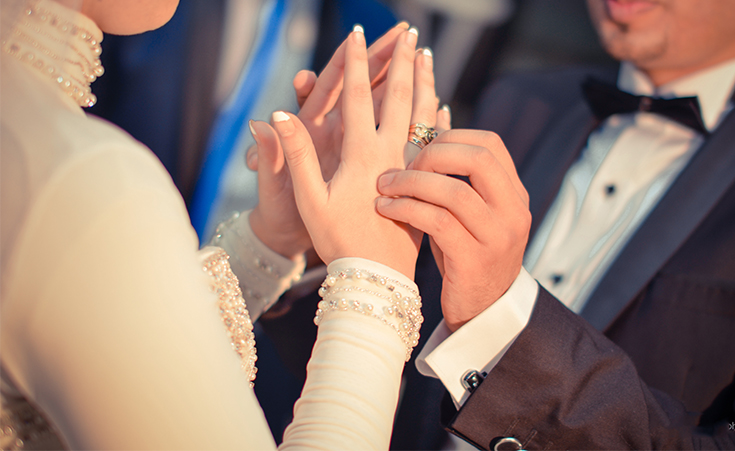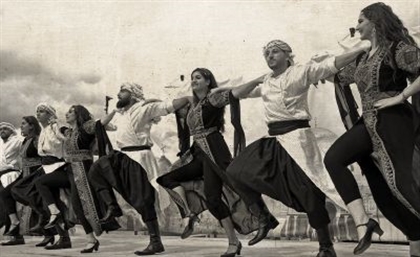I Married My Cousin: Endogamy in Egypt, Between Tradition and Genetic Concerns
In most of the world intra-familial marriage is considered blatantly taboo but in many countries, including Egypt, the practice remains commonplace. Valentina Primo meets three cousin couples to talk societal norms, parental pressure, and the potentially dangerous medical ramifications.

A washed winter sunset is looming through the window of this cosy flat in Cairo’s upscale neighborhood of Dokki. Layla* opens the door as a colossal smile takes over her petite body, leading us into a room filled with stuffed animals, golden furniture, and curtain tassels. There are statuettes and souvenirs nearly on top of every piece of furniture, and some faded photos of her with the Eiffel Tower adorn the walls.
“I got married to my cousin when I was 15,” she says as she pulls out a photo album. “As soon as his mother saw me all grown up, she arranged for our wedding to take place,” she narrates. Youssef*, who was 26 years old, did not want to get married; but he was told he didn’t have a say. “It was the normal thing to do at the time. People usually preferred to marry a relative because we all know each other and care for each other more than the rest,” she says. Both her brothers married a member of the extended family, as her cousins did too.
A year later, the couple gave birth to their first child Omar*, who had autism. “He passed away when he was 18; he could memorise Qur’an, but I think he didn’t know who we were. Medication for autism wasn’t developed at the time, so the only thing he could say is Allah,” she recalls. “The doctor said that he was disabled because we were cousins, so we decided not to have a second child.”
Married couples with higher consanguinity (blood relation) have “increased chances of sharing genes for recessive traits, which can carry certain diseases,” explains Alyaa Gad, MD and founder of the health educational platform Afham.TV. Although isolated cousin marriages may pose little risk, she explains, repeated consanguineous marriages within a population group cause more health hazards.
When Layla realised she was pregnant again a few years later, it came as something of a shock. “We decided to have an abortion, as the doctor had said the same thing would happen again and the baby would be disabled,” she says. But they did not know that Layla was carrying twins, and nine months later, her daughter Nevine* was born.
Unlike her parents, Layla’s daughter did not marry a relative and chose her partner out of her own will. “I didn’t interfere and let her choose; to me, marriage is freedom,” Layla says. “Nowadays, highly educated Egyptians hardly ever consider cousin marriage, while it is customary in the countryside. But in countries like Saudi Arabia and the United Arab Emirates, endogamy is very common,” says Gad. In the Emirates, researchers from the University of Abu Dhabi have found the presence of 240 genetic (inherited) disorders, and that 92 per cent of deaf children in the country are of blood-related parents. The phenomenon is known as inbreeding depression, a term that describes “the reduced biological fitness in a certain population as a result of the breeding of blood-related individuals,” the physician explains.

A groom stamps his finger on the marriage contract with the help of his father-in-law, following an Egyptian tradition.
“I laughed at how ridiculous it was”
In the classy neighborhood of Zamalek, in Cairo’s Gezira island, Menna* awaits her grandchildren’s visit. “I have three children and, Alhamdulillah, nothing went wrong, but I was terrified when I was expecting my first child,” she says. The 80-year-old woman got married to her cousin when she was 18, although she had first refused his proposal.
“I was 16 and I was living in England the first time he proposed. I remember my friends and I laughing at how ridiculous the idea was,” she recalls. “I was convinced it was the wrong thing to do; I was afraid of having children who aren’t normal or something. But he kept insisting, and finally, after two years of on and off, we were married.” Her parents, who were cousins as well, wanted the marriage to take place. “They saw in him a good husband for me and, indeed, it turned out to be a very happy marriage in the end,” she says.
Rough estimates indicate that between 30 and 40 per cent of Egyptian marriages happen between relatives, a tradition that dates back thousands of years, rooted in the need to secure relationships between tribes and preserving family wealth. The tradition was particularly prevalent amongst fellahin (farmers) and Sinai tribes, and was not exclusive to Muslim families, extending to Christian Coptic communities as well.
“Everyone thinks differently; it depends on the way you were raised,” Menna explains. “I guess if you’re in love with your cousin, you’ll probably find some excuse to marry them. But if you were raised never to see your cousins as potential spouses and, rather, to think of them as siblings –you would never get that far. Personally, what helped me was that I didn’t know him. I hadn’t been raised with him.”
Between a choice and a cliché
Far from finding ground in parental pressure and conservative values, a few Egyptian youngsters still choose their partners within familiar circles, driven by more romantic values. “There wasn’t a specific moment when I thought about getting married to my cousin; it just happened that way. We fell in love,” says Mohamed, a 28-year-old production engineer who lives in Mohandesin.
“People still assume that some cousins get married to save the family money or that they are forcing them to get married so that the girl doesn’t get called 3anes (a spinster),” he says. “But that is not always the case. In my circle of friends, it is not really common. I usually get two types of reactions: either the most clichéd one, which is: ‘Oh, aren’t you afraid of having disabled children?’ Or ‘is it to that extent that you didn’t like anyone outside of your family so you decided to marry within?’ And the other reaction is ‘oh, how beautiful, you must be together since childhood’.”
But his younger sister, who felt the family dynamic change with her female cousin, is not so happy about the idea. “I am sure my parents do not like it either, but they respect his decision,” she says.
Although he is skeptic about the dangers of endogamy itself, Mohamed affirms that he will have medical check-ups before having children. “Out of all people I know who married their cousins, none of their children had any problem. I also know unrelated couples who have disabled children, so I don’t think it has to do with it,” he comments.
Back here in Dokki, the sun has set and Layla heads to the kitchen to prepare some Turkish coffee as she narrates the story of her second marriage with a man who was not related to her family. “When my first husband passed away, I was still in my thirties,” she says. “I met Ahmed* in my circle of friends; it was a completely different story. We got to know each other for a year before getting married. He was much older and he had his own kids too, but we were very much in love,” she recalls.
She opens the carefully decorated photo album and flicks through images of the Arch of Triumph, Disneyland, and the canals of Venice. “Ahmed and I roamed the world and grew old together,” she says, her eyes twinkling.
“It was somehow better because we got to know each other; we got to know what each one liked, how each one talked. It’s better than just taking me and ye3sor 3ala nafso lamoona (squeezing a lemon on your head to endure) and then learning to love me later on. I know the first one was forced to marry me at first, and it was a gift from God because he fell in love with me after we married. I loved him very much, too. But we didn’t share any interests, and we liked different lifestyles,” she says.
*In order to preserve the interviewees’ privacy, and following their request, some names have been changed.
Photography by Ahmed Najeeb.
- Previous Article Batal: A New Video About Poisoning Stray Animals
- Next Article SceneSounds Vol. 5: Timmy Mowafi
























